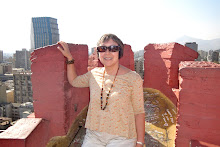Noor Al Moataz
EAP 020
9/29/08
In every society, social status plays a big role in daily life. Coming from a stereotypically materialistic upper class in Bahrain, I recognize the difference between classes. There is an obvious gap between high-income and low-income status. This has lead to stereotyping based on both financial and social status, which has been growing slowly over the years.
There are many differences between the upper and lower classes. These differences are applied to social aspects, such as work, home, and socializing. These aspects play such a big role in daily life that they define a person’s function in society, giving them a status to either uphold or change. Inevitably, these are the core reason as to why people are labeled in such high or low regard.
The population of Bahrain is only 718,306. About twenty five percent of the population (179,576) consists of expatriates who have come to Bahrain from India, Pakistan and the Philippines, to find suitable jobs in order to provide for themselves and their families. A majority of these expatriates are considered to be lower class. This is because they work as servants for wealthy upper class families in society who provide them with minimum wages. Comparing the expatriates’ jobs to the jobs of their counterparts shows the evident contrast between them. The upper class members of society earn between BD 1500 to BD 10,000. The lower class, on the other hand, earn between BD50 to BD250. This makes it difficult for the lower class to transcend into the upper class.
Of course, jobs affect an entire household. Work is the main item that segregates the upper class from the lower class. Having a big and high-income job defines one as a well-off person who is able to provide a substantial amount of societies luxuries for their family, such as a good education and other indulgences like having expensive cars, a large house, and lavish vacations. Having the advantage of possessing such luxuries builds one’s reputation. This social status defines a person and shows where one stands in society via the way others perceive them. Usually, people who are considered upper class surround themselves with people with similar backgrounds. This concept is also applied to the lower class. Unfortunately, this causes a huge rift between the classes, causing them to avoid socializing with each other.
In conclusion, I believe that the gap between upper and lower class exists in every society and culture; mainly due to the way things have gone in past generations. Therefore, the vicious cycle will never end until people decide to put a stop to social “discrimination” based on financial status. People sometimes find it reasonable to avoid associating with those of less “status” than themselves since that association is detrimental to their own. In countries, where the society is small and closed, and very fierce, the barriers between classes are easily visible, but hardly reconcilable.
Thursday, October 2, 2008
Subscribe to:
Post Comments (Atom)

No comments:
Post a Comment